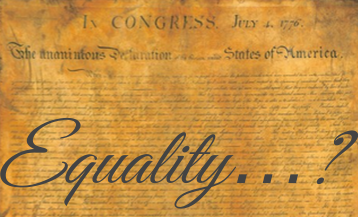Discrimination....A Good Thing?
“DISCRIMINATE, verb transitive [Latin , difference, distinction; differently applied; Gr., Latin ] 1. To distinguish; to observe the difference between; as, we may usually discriminate true from false modesty.” (http://webstersdictionary1828.com/)
Discrimination is a good thing. In fact, you and I do it all of the time. Our society would collapse without discrimination. It is a necessary and vital part of life. For example, say you go to gas station “A” instead of gas station “B” because gas station “A” is 2 cents cheaper. You just discriminated against the higher priced gas station. Say you go to one restaurant versus another because you like the food better. You just discriminated. Or perhaps you run a company and you choose to hire one person over another because of a higher education or better experience. You just discriminated.
The above definition is probably not what springs to mind to most these days. The reason being that the word has morphed to mean, “to make an unjust or prejudicial distinction in the treatment of different categories of people or things, especially on the grounds of race, sex, or age.”
That is the ‘bad’ kind of discrimination. The topic of today is the Religious Freedom Restoration Act (RFRA) law that Indiana (and subsequently Arkansas) passed this last week (and previously nearly 20 states and the federal government have already passed). There has been a media uproar concerning this law, and frankly, it puzzles me.
This law has nothing to do with discrimination.You see, the point at which discrimination becomes a bad thing is when its practice infringes on a person’s basic human rights - life, liberty and the pursuit of happiness.
Now, this is important right here, in this debate, the question then becomes, under which of these three does a person’s right to be served by a business fall? Life? No. Liberty? No. Pursuit of happiness? No!
“But,” one may say, “getting that business to,” (let’s just say for illustration), “make me a cake would make me happy.” But that’s not what we are guaranteed here in America. We have the inalienable right to the PURSUIT of happiness, not happiness itself. Therefore, if having a cake made it what’s going to make you happy, and this business won’t do it, they have not violated any of your rights.* You still have the right and ability to pursue your happiness, by going to another bakery.
Let’s be honest, this debate is not about discrimination.
If it was, then we wouldn’t be seeing calls for “boycotting Indiana”, etc. If a business is not allowed to discriminate (using the ‘good’ definition above) concerning whom it serves, then why am I allowed to discriminate concerning whom I give my business to?
According to those ‘boycotting’ Indiana, we have the right, nay, the responsibility to discriminate against this state, the businesses and the people in it by refusing them our business. These people are discriminating against Indiana because Indiana (just like nearly 20 other states and the federal government) are fighting to protect the God-given right to freedom of religion through the RIFRA.
Jonathan Paine
painefultruth76.blogspot.com
@painefultruth76
painefultruth1776@gmail.com
*[Please note: I understand the Civil Rights Act of 1964 (specifically Title II and Title VII). My argument here is obviously going back to our Founding Documents that laid out how government was truly supposed to operate. Sadly, this understanding has largely been lost and that is why ill-advised laws such as the Civil Rights Act of 1964 (Title II and Title VII) were enacted. I’m not advising that people should violate this law or any other, I am merely saying that it’s high time we get back to the basic principles - government is to protect rights, not privileges.]


Comments
Post a Comment